
We recently featured the story of Gerardo Hernandez-Contreras, a father who was deported after a traffic violation, on our blog. People sympathetic to Mr. Hernandez-Contreras blamed Congress for failing to pass immigration reform, while others pointed the finger at the Obama administration and overzealous local police.
But other readers commented that Mr. Hernandez-Contreras is to blame for his own predicament because he never took steps to apply for legal status. In the words of one commenter:
What went wrong? He never went for his green card, or started going for citizenship...
Another put it this way:
Clearly he had no loyalty to the US since, being married to a US citizen, he could have taken steps to adjust his status.
These comments represent a very common misconception: that undocumented individuals with U.S. citizen family or significant ties to the United States can easily apply for legal status. Unfortunately, even though that's a logical assumption, our current immigration system is anything but logical. The reality is that for millions of undocumented individuals with U.S. citizen spouses or other family, there is no easy way to "get in line" to get a green card.
First and foremost, as a result of changes to immigration law dating back to 1996, millions of undocumented individuals are subject to 3- or 10-year bars, during which they are ineligible to apply for a green card. Any immigrant who has been in the United States without legal status for more than 6 months but less than one year is ineligible to apply for a green card or reenter the country for 3 years; any immigrant who has been undocumented for more than a year is barred for 10 years. That's a very long time to be separated from your family.
In Mr. Hernandez-Contreras' case, if he left the country to apply for a green card at an embassy abroad – as he would have been required to do – he would have been subject to a 10-year bar to returning to the United States and his U.S. citizen wife and children. His 6-year-old daughter's sweet sixteen would have come and gone before he could even have submitted a green card application.
If you think that these bars do not make sense, you're not alone. Diverse organizations, such as the Heritage Foundation, Center for Immigration Studies, and CATO, as well as Republican Reps. Raúl Labrador, Steve Pearce, and Bob Goodlatte are on the record critiquing the bars or supporting elimination in some fashion.
Second, the backlogs for processing family-based visa applications can take decades. Spouses of permanent residents (green-card holders) can wait 7 to 10 years to come to the United States legally. Other family members can wait between 4 and 22 years. For Mr. Hernandez-Contreras, this would mean missing milestones in his family's life, such as high school and even college graduations.
So while it might seem logical to ask why Mr. Hernandez-Contreras did not apply for legal status, a better question is why we made it virtually impossible for him to do so.
Learn more about immigration reform and other civil liberty issues: Sign up for breaking news alerts, follow us on Twitter, and like us on Facebook.
Stay informed
Sign up to be the first to hear about how to take action.
By completing this form, I agree to receive occasional emails per the terms of the ACLU's privacy statement.
By completing this form, I agree to receive occasional emails per the terms of the ACLU's privacy statement.
